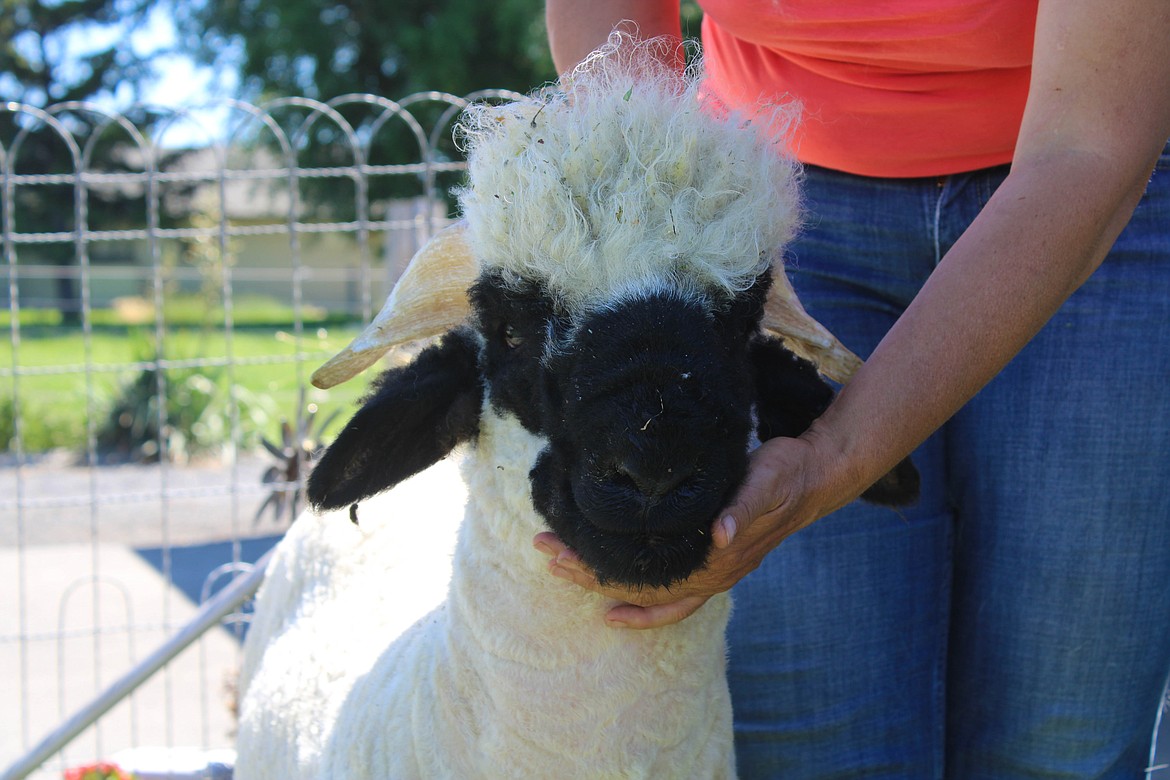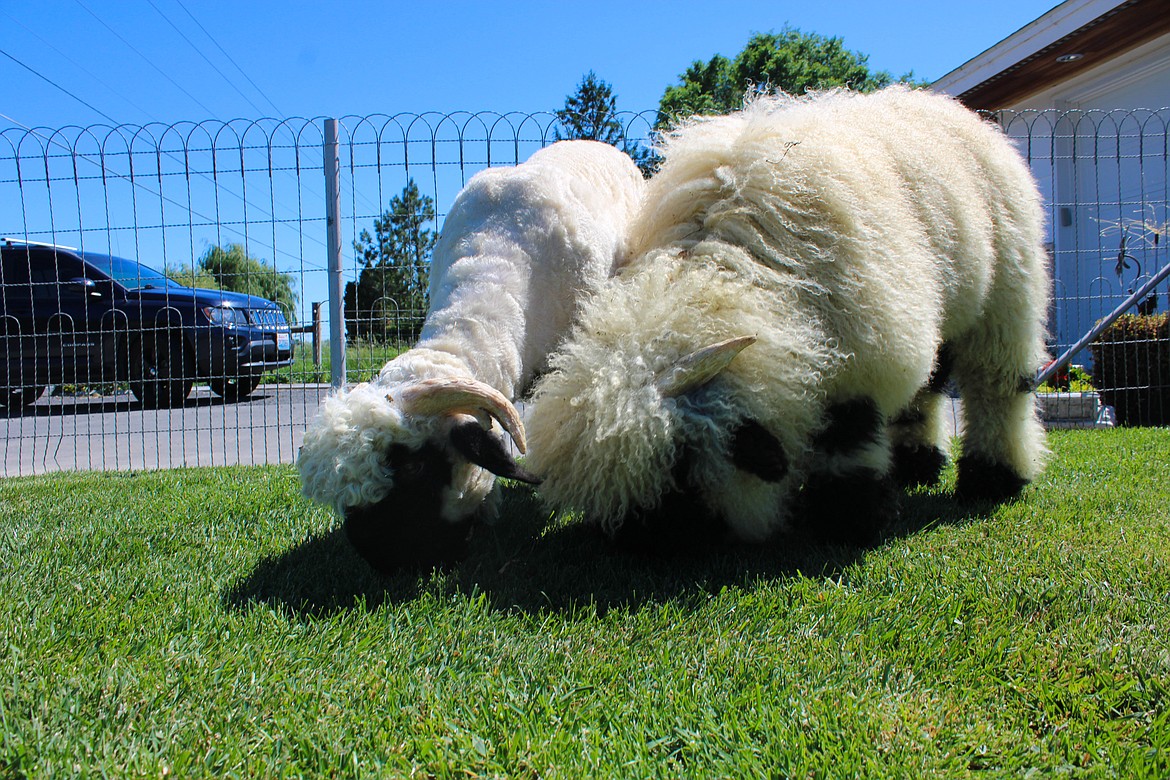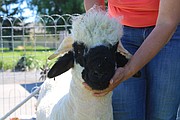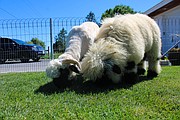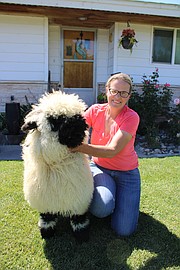Shear joy: Breeder finds calling with rare sheep
MOSES LAKE — Of all the animals Washington State University regional extension specialist, livestock and meat quality, Sarah Smith tends to, her Valais Blacknose sheep are the rarest.
Originating in the Valais region of Switzerland, the sheep have straight legs and a long body, a stark black face and are otherwise a ball of fluff. Many consider them the cutest sheep in the world.
Compared to Smith’s other sheep, her three Valais Blacknose – Remarkable, Hoosier Daddy and Kramer – are clowns, she said. As she sits on her porch, they nuzzle into her, nibble off the grass by her feet, blooms of her flowerbeds, even the hair tie on her head.
Smith was born into the sheep world, she said. Growing up on a small family farm in northern Idaho, she initially wanted to be a vet – but only because she wasn’t aware of the vast options.
“I really greatly appreciate our vets, they are hard workers … but for me, I’m in production ag,” she said.
From small farms to large feedlots, Smith, based in Moses Lake as part of the WSU Extension Animal Ag Team, ensures safety and quality in food animals.
She works closely with the local 4-H and FFA groups as well, she said. She raises the sheep for 100 days, then passes them off for kids to raise for another 100 before they show them at the fair.
She likes the fair part of it a lot, she said. Sometimes kids get teary-eyed about losing their animals, and this is where her role comes in.
“I can assure you, I spend a lot of time in packing room floors and where animals are harvested, and it’s a very humane death,” she said.
In packing houses, there are USDA inspectors and all sorts of animal handling and safe food experts ensuring that every aspect of the process is done the right way, she said.
“I love these guys,” Smith said, patting Kramer. “When it’s their time, I want it to be done right.”
This is one of many misconceptions in her line of work, she said. Another is how quickly farming practices change, she said. A lot of people think it’s been done the same way it was when they were young. Ranching technology is rapidly growing, she said. Antibiotics and vaccines are a lot better than they used to be.
Even the shearing process -- the tools might look the same, but they work better and safer for the animals.
“You don’t want to raise animals like our grandfather, and not because they didn’t do a good job, but we can do better,” she said.
As she explains, Smith has to stop every few moments to yell at the sheep or her 16-month-old guard dog, Berk.
“I think that’s the biggest misconception,” she said. “A bigger misconception is that they won’t eat your flower plants.”
Farmers in the Columbia Basin are more innovative than most, she said.
“That’s why I like my job. It’s continuous learning, and the producers I work with, it’s not just they want better for their animals but they want better for their family,” she said.
Smith moved to the area in July of 2000, she said. Coming from a place covered with trees, at first she was skeptical.
“It’s dry, hot, planes are flying up above,” she said. “I just drove into Moses Lake, all I’ve seen is what they call the lake.”
But because of the unique agricultural irrigation system from Columbia River water, it takes such a low amount to produce both high quality and quantity of specialty crops, cherries, apples, potatoes, and then byproducts to feed the animals, she said.
“Twenty-one years later, I ended up in the best ag place,” she said.
Not only is it the best, Smith said, but it has the best future. Because of the Grand Coulee Dam and the Columbia Basin Project, the Basin doesn’t have a 100-year farming tradition, she said. If anything, the agricultural tradition here is one of change and new technology.
Everyone here thinks outside the box, she said.
“I feel like I have to be on my toes to work with these guys,” she said.
For the most part, everyone has the same goals, she said: higher profit, better quality food, safer production and to make it so every day of an animal’s life is a good one.
“Sometimes I’m like, ‘Change is not good.’ Like, when I had to get a puppy,” Smith says with her fingers deep in Berk’s long, white fur. “I’m like, ‘I don’t do puppies,’ but I’m making it. We’re making it.”
Smith first saw Valais Blacknose sheep online and loved their exotic look, she said. At the time, they weren’t in America and there was no way to get them here – not even their semen.
Because of this, she started making “knock-offs” she said, by mix-breeding different types of European sheep. But in 2017, the first shipment of Valais Blacknose semen came to the U.S., and she hopped on it.
It was a challenging process, she said, as sheep require laparoscopic semination, a surgical procedure. At last, her first true Valais Blacknose sheep was born in June, 2018.
Two years later, she got hold of embryos conceived in New Zealand and implanted here in the States, she said. That means Hoosier Daddy, Kramer and Remarkable are full blood.
“It’s kind of crazy I put this much emphasis on this,” Smith said. “It’s like, you could go on vacation or you can hang out with sheep.”
Smith doesn’t show her Valais Blacknose sheep through 4-H or FFA typically, but she does like to bring them to the fairgrounds and other places for people to see, she said.
The past couple years, too, it’s been really challenging to sell wool, which has to be processed in China, she said.
“Between tariffs and COVID, our wool market has really gotten hurt,” she said. “So wool is not a very good money maker to be completely honest.”
The livestock market changes rapidly, she said, so next year could be a completely different story.
Her next challenge may be obtaining hair sheep from South Dakota, she said, which are low care and offer a lot to the industry.
For the most part, though, her plate’s full with what she has, she said.
Berk battles for her attention as she says this.
“Especially with that ding-dong,” she said.


